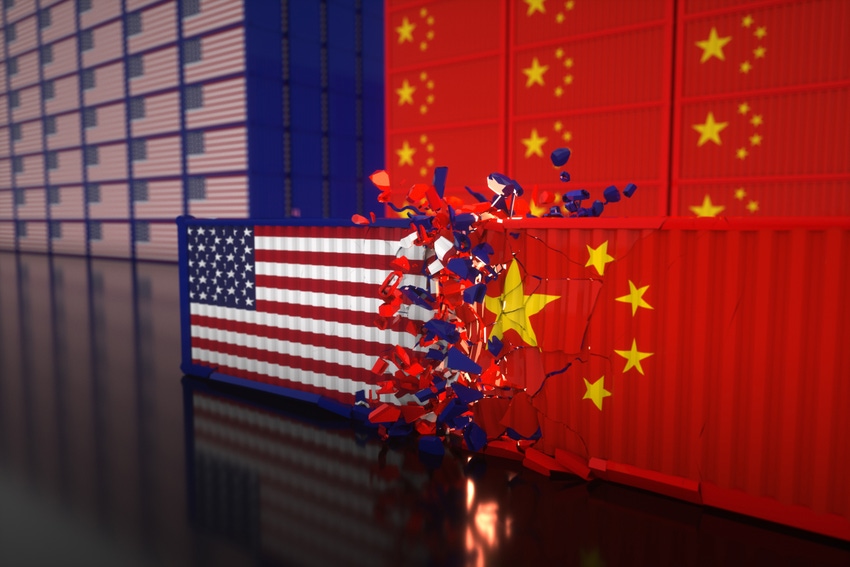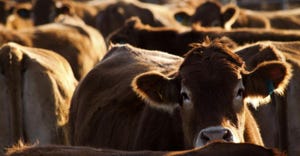It appears a U.S.-China trade deal will happen, at least partially. Here’s a rundown.
October 17, 2019

How the new "Phase One" U.S.-China deal strikes you depends on who you are. President Trump is happy and feels the deal is a major step forward. Treasury Secretary Steven Mnuchin has indicated he thinks it has potential but cautions that while he thinks a deal will come to fruition, there is a lot yet to be done.
If you are Vice Premier Liu He, you smile a lot and go to the White House to meet with President Trump as a sign the Chinese are still serious about meetings. If you're Chinese state media, you mention the atmosphere is much better, nothing is mentioned about ag commodity purchases, and nothing is final because nothing is written down. Then there are those cynics who see this not as an interim deal but just a cessation of tariff hostilities and a more friendly atmosphere.
The Trump Administration feels certain they got a commitment for $40 to $50 billion in ag commodity purchases, but it hasn't been spelled out what the time period is. If it is a year, it is a big upgrade from the $24 billion in 2017. If it is spread out over a couple years, it is not.
Of course, for livestock feeders, that is a double-edged sword, if the commodities are corn, soybeans, wheat and pork. There was no public mention of beef. But the situation reminds me of 10 years ago, when corn farmers were suffering greatly from lousy prices and livestock feeders wanted them to get better prices so as to make sure there was enough supply for the long term.
The ethanol mandates happened, and corn farmers not only healed up, but market factors and government interference meant feeders were suddenly paying $7.00 and $8.00 per bushel for corn.
This time, even if China goes "hog wild," they don't have near as many hogs to feed and recovering the Chinese market could mean a profit, but it’s not likely to make the market go ridiculous. China has already been buying a lot of beans in August and September.
What we know
Some intellectual property protection has been agreed upon in this first stage agreement. But the other big issues, like forced technology transfer and state-subsidized companies, are being left to Phase Two or Phase Three negotiations.
Rules preventing currency manipulation were also said to be part of this agreement outline, although they had also agreed to that long before the great "renege" last spring. Trump did agree to postpone the jump in tariffs from 25% to 30% that was scheduled to happen this week.
A new batch of tariffs is scheduled for December 15, unless enough progress is made that the President decides to delay or cancel it. Tariffs on $360 billion worth of Chinese goods are still in place. The Chinese also reiterated their promise to open the door for financial and insurance companies to do business in China, plus foreign ownership of securities and futures, all in 2020.
Why only half a loaf?
So why this interim agreement? Apparently, both economic and political issues factor in. China wants to keep the dialogue going, as it needs pork and beans. President Trump wants and needs to help farmers and ranchers who have borne much of the pain of this trade war and needs to keep the dialogue going because he has bigger goals in mind and, frankly, he needs to win the election so he can finish not only the China deal but many other things.
That the tone of this set of negotiations ended quite friendly was surprising, given that some observers thought the Chinese would go home in a snit after only a day of the deputy level discussions. Moreover, the U.S. had just blacklisted eight Chinese firms that not only were involved in the mistreatment of Muslims in China but just happened to be big in artificial intelligence development in China, using U.S. computer chips and likely stolen secrets.
All in all, 28 Chinese tech companies and security bureaus had been blacklisted for claimed involvement in human rights abuses—things necessary but not guaranteed to make your international guests arrive happy.
Then there is the Huawei issue, the elephant in the room that both sides chose to wall off and deal with in a separate negotiation. One Chinese researcher at a U.S. university has been charged criminally and civilly with espionage on behalf of Huawei.
China's economy is projected by outsiders to slow to a 6.2% GDP growth rate this year, compared to 6.6% last year. That's a much better growth rate than other developed countries, but for China, it is a cause for concern. This was supposed to be the year China cut down on debt.
Instead, it has had to lower reserve requirements for its banks three times to encourage them to lend to businesses and it devalued its currency. The government also dispatched monitors to over 100 Chinese companies to make sure they were toeing the Communist Party line, illustrating the degree of control the government wields over Chinese business.
The NBA flap also illustrated that control. The Houston Rockets GM tweeted support for the Hong Kong protesters. Within hours, China, which has an estimated 500 million enthusiastic NBA fans, made sure all mentions of the NBA were scrubbed from the internet, merchandise pulled from stores, sponsor partners suspended their deals, NBA ads disappeared and the telecast of an exhibition game that week cancelled in China.
Some 300 million Chinese play basketball. But all that is nothing compared to adhering to the Party line and expressing only favorable comments about the Communist Party.
The Hong Kong situation has lasted for many months and the "relationship" between the protester/citizens and law enforcement in town has gradually deteriorated. China is very unhappy with that situation. but so far has not dared to directly intervene despite having troops gathered just outside town, for fear of another Tiananmen Square episode. Though that was 30 years ago, it is still a stark vision for much of the world.
In China, most citizens know little about it. President Xi not only does not want to tolerate dissent in Hong Kong; he also has a personal motivation, as his father once was very involved in Hong Kong.
Playing hardball
There are critics in Washington who don't like the President's methods, especially using tariffs and going at it alone. But this president is not long on patience. Building a coalition of timid European allies to confront China would take many years, if it could be done at all. Even now, with Trump's coattails to hide behind, very little support has been publicly expressed, though they agree something must be done about China.
As for utilizing the WTO, the beef industry has had firsthand experience with the glacial pace of the WTO. It took the WTO several years to get around to investigating and passing things through panels and appeals and finally ruling on mCOOL. The big airline case involving Europe's subsidizing of Airbus has been winding through the WTO process for 15 years.
Neither of those options are very appealing, especially since no one on either side of the pond has been willing to antagonize the government of the giant Chinese market for decades. All the while, its economic and military might has grown immensely. Time is of the essence to President Trump, to say nothing of the fact that he sees himself as the only one with the gumption to do the deed.
I still have to believe that the President has no intention of abandoning the effort, the economic pain agriculture has endured, the costs to businesses and consumers already suffered to give up on a big deal with China. The question is, can he inflict enough pain, enough damage to China's standing in the world, enough slowing of their drive to dominate the world to convince President Xi and the Communist Party that they must adjust their methods and attitudes?
Iowa Senator and Chairman of the Senate Finance Committee, Charles Grassley (R-IA), expressed his opinion that any progress is a good thing.
That follows the thinking President Ronald Reagan expressed more than once, that half a loaf is better than none. Hopefully USTR Robert Lighthizer will keep the pressure on toward more phases to resolve more key issues.
Dittmer is a longtime beef industry commentator and executive vice president of the Agribusiness Freedom Foundation.
About the Author(s)
You May Also Like


.png?width=300&auto=webp&quality=80&disable=upscale)

.png?width=300&auto=webp&quality=80&disable=upscale)
